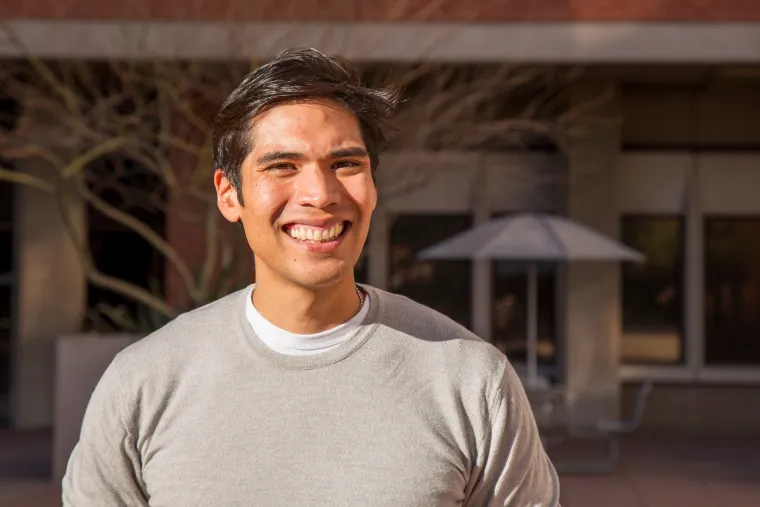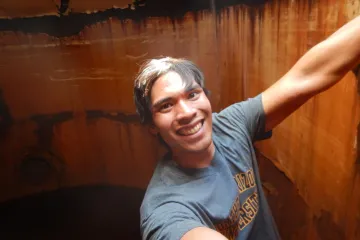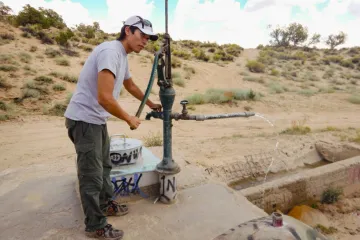Jonathan Credo, PhD: ‘The physician and scientist I want to be’
An MD/PhD student finds his voice as a healer and an advocate.

Jonathan Credo, PhD
Anna C. Christensen, College of Medicine - Tucson
After his early years as a self-described “army brat,” Jonathan Credo, PhD, spent most of his childhood in Flagstaff, close to the Navajo Nation where he has roots on his mother’s side.
He majored in biochemistry and biomedical sciences at Northern Arizona University, where he got his first taste of research collaborating with tribal communities investigating contaminants in the water on the Navajo Nation, where uranium and hard-rock mining have wreaked havoc. He was hooked.
“It really opened my eyes,” he said. “I would love a career where I can work with the community to answer their questions, not only from a clinical perspective, but also a research perspective.”
Working with communities
As an MD/PhD student at the College of Medicine – Tucson, Dr. Credo completed two years of medical school before switching to a doctoral program in clinical translational sciences. His research saw him working with tribal communities across the western U.S. to investigate how environmental exposures affect health.

Jonathan Credo, PhD, studied the health effects of environmental exposures in tribal communities across the western U.S.
“I continued some research partnerships with the Navajo Nation, but my PhD really expanded my collaborative network with tribes across Arizona and the West,” he said. “In the community-based participatory research model, the community is intimately involved. The community is at the core of all the decisions we make. They guide the research.”
He would like to use his training to be a better advocate for the communities he serves.
“Chronic conditions like diabetes and hypertension can be exacerbated by exposure risks, such as mining and water contamination,” he said. “My research is based in advocacy. What kind of policy change or initiatives can we enact to limit exposures?”
Treating the whole patient
In May, Dr. Credo will receive his medical degree, but first, in March, he hopes to match into a combined residency program in internal medicine and psychiatry.
“I’ve never met someone who doesn’t have a brain and a body. Both of them influence one another,” he said. “Those two specialties complement one another to provide the best care to the communities I want to work with — tribal, minority and rural populations.”
Dr. Credo cites a high demand in these communities for physical and mental health to be treated concurrently, in recognition of the whole person.
“Someone who’s stressed at work, had tribulations in their life, it’s harder for them to manage their condition, and these conditions spin out of control,” he said. “Diabetes gets worse, hypertension gets worse. Yes, you can treat it strictly medically, but how do you give these patients tools to be more resilient to stressors in their life?”
Returning to a smaller community

Jonathan Credo, PhD, says some of his happiest memories as an MD/PhD student were in the field.
After completing residency training, Dr. Credo hopes to serve an area like his hometown.
“I would love to go back to a smaller community to have that touchstone of what the community is dealing with, their day-to-day concerns,” he said. “I don’t want to lose that.”
By keeping his finger on the pulse of these communities, he hopes to be an advocate for his patients and neighbors.
“When I first came to the University of Arizona, I wanted to help tribal, minority and rural populations, but I didn’t really understand what that meant,” he said. “My time and experiences here have helped shape the type of physician and scientist I want to be, and influenced how to be a better advocate.”
He’s looking forward to Match Day, which he says he’ll probably celebrate with “a nice long run.”
“Right now, I’m running 40 to 50 miles a week,” he said. “I love being outside, in nature. Wherever I match, my top programs are places where I have that close connection to nature.”
Show your support for future physicians like Dr. Credo by giving to the College of Medicine – Tucson Student Scholarship Fund.

